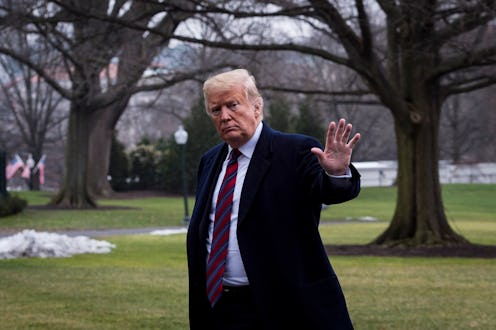News
Here's Why Trump's New Immigration Compromise Probably Won't Reopen The Government

On Saturday, as the government shutdown approached the one-month mark, President Donald Trump proposed a plan to reopen the government live from the White House. Trump's immigration compromise would expand protections for Deferred Action for Childhood Arrivals (DACA) recipients and Temporary Protected Status (TPS) holders in exchange for the $5.7 billion that the president has demanded to fund his border wall. However, Bloomberg reported that Democrats have rejected similar proposals in the past, and are unlikely to accept this one.
Ahead of Trump's Saturday remarks, House Speaker Nancy Pelosi said in a statement that Trump's proposed compromise is unlikely to pass the House:
“Initial reports make clear that his proposal is a compilation of several previously rejected initiatives, each of which is unacceptable and in total, do not represent a good faith effort to restore certainty to people’s lives,” Pelosi said. “It is unlikely that any one of these provisions alone would pass the House, and taken together, they are a non-starter.”
According to Vox, Trump reportedly did not consult with Democrats before making this proposal — and his speech made that clear. Democrats are unlikely to budge on the issue of border wall funding, Vox reported, and Senate Minority Leader Chuck Schumer said earlier this week that Democrats would rather wait until after the government is reopened to debate border security.
In his speech Saturday afternoon, Trump also called for hundreds of millions of dollars in funding for "urgent humanitarian assistance" related to immigration, and for "drug detection technology to help secure our ports of entry." Trump then went on to demand an additional 2,750 border agents, as well as 75 new immigration judge teams to reduce a court backlog of 900,000 immigration cases.
The president's main proposal, however, was his supposed compromise with Democrats, composed of ideas that he argued were "proposed by Democrats themselves" in the past. This two-part compromise would "build the trust and good will necessary to begin real immigration reform," Trump said.
First, Trump proposed "three years of legislative relief for 700,000 DACA recipients" — an extension that Trump said would "give them access to work permits, Social Security numbers, and protection from deportation." Trump also proposed a three-year extension in the status of TPS-holders.
"This means that 300,000 immigrants whose protected status is facing expiration will now have three more years of certainty so that Congress can work on a larger immigration deal, which everybody wants — Republicans and Democrats," Trump said.
Trump's assertion that similar policies have previously been proposed by Democrats appeared to allude to last year's government shutdown. That shutdown began after Trump rejected a deal from Schumer to open up a pathway to citizenship for DACA recipients in exchange for $20 billion in border wall funding, CNN reported at the time.
As a result, Politico reported that Pelosi and other Democrats do not view Trump's proposal as a serious compromise to reopen the government, given its resemblance to proposals that failed in the past. Despite Democrats' opposition to Trump's proposal, however, Senate Minority Leader Mitch McConnell said in a statement on Saturday that he intends to take up the proposed legislation in the Senate this week.
"With bipartisan cooperation, the Senate can send a bill to the House quickly so that they can take action as well," McConnell said in his statement. "The situation for furloughed employees isn’t getting any brighter and the crisis at the border isn’t improved by show votes. But the President’s plan is a path toward addressing both issues quickly.”
As Senate Minority Whip Dick Durbin indicated ahead of Trump's remarks, Democrats are unlikely to budge on this issue. Instead, they are demanding that Trump stop holding the government hostage, and have expressed an interest in discussing immigration only after the government has been reopened.